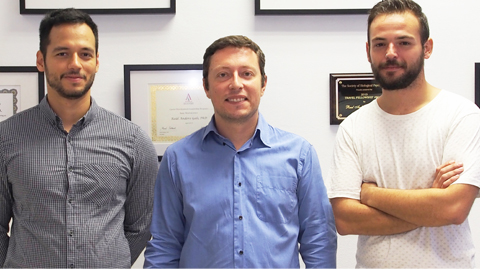Scientific discovery explains why stress hormone can prevent disorders after exposure to traumatic events

31/08/2017
People who have suffered from traffic accidents, war combat, terrorist attacks and exposure to other traumatic events have an increased likelihood of developing diseases. These diseases can be psychological and physical, such as heart problems and cancer. The current preventive treatments based on psychological support and drugs are effective in some cases. Unfortunately, these treatments do not work for many individuals. It is also known that the earlier the treatment starts the better to prevent future negative consequences.
Researchers at the Institut de Neurociències of the Universitat Autònoma de Barcelona (INc-UAB, Spain) have discovered in a study with mice and humans that the Ppm1f (Protein phosphatase 1f) gene expression is one of the most highly regulated after exposure to traumatic stress. Moreover, Ppm1f is associated with posttraumatic stress disorder (PTSD), depression and anxiety. The main function of Ppm1f is to regulate the activity of the protein Camk2 (Calmodulin-dependent protein kinase 2), which is key in many processes of the human body such as memory, the heart’s functioning and the immune system.
According to Dr. Raül Andero Galí, lead researcher in this study, “Once we discovered the relationship between the Ppm1f gene and different psychological disorders after exposure to traumatic stress, we wanted to find an effective drug to prevent these changes and its negative consequences on the brain”. Dr Andero is scientist at the INc-UAB. It was already known that dosing the stress hormone - a glucocorticoid - few hours after exposure to a traumatic event may decrease the likelihood of developing psychological disorders. Thus, the scientists administered the hormone to mice one hour after exposure to stress. “The results confirmed a decrease in the symptoms of anxiety and depression, and also that this effect is because the Ppm1f gene changes are prevented,” explains Dr. Eric Velasco, researcher at the INc-UAB and co-author of the study.
“The apparent contradiction that the stress hormone decreases the likelihood of developing diseases after exposure to traumatic stress is one of the greatest paradoxes of current medicine” Andero says. “This study sheds light on this paradox and uncovers a way by which the stress hormone could prevent diseases, at least psychologically, through regulation of the Ppm1f gene” he adds.
Until now, the stress hormone has been administered to people in very few cases. “Our discovery opens the door to a broader application and to the development of treatments aimed specifically at regulating this gene's functions", says Antonio Florido, researcher of the INc-UAB and also co-author of the paper.
The study was carried out in collaboration with the universities of Harvard and Emory (United States). This work is published in Biological Psychiatry, one of the most important journals in Neuroscience. The UAB researchers are currently interested in collaborating with other laboratories and obtaining funding to continue the studies of Ppm1f associated with other disorders such as cardiovascular diseases and cancer in order to verify whether their results are comparable in other diseases and potentially prevent them.
Original article: Expression of the PPM1F gene is regulated by stress and associated with anxiety and depression. Aliza P. Wingo, Eric Velasco, Antonio Florido, Adriana Lori, Dennis C. Choi, Tanja Jovanovic, Kerry J. Ressler, Raül Andero. http://www.sciencedirect.com/science/article/pii/S0006322317319017